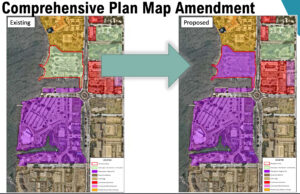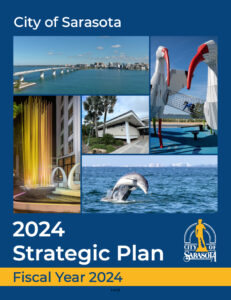Ending a cannabis diversion program, changes to Bay Park plan, strategic priorities.
By Dania Hefley
Original Air Date: Nov. 22, 2023
Host: The end of a cannabis criminal diversion program, changes to Bay Park plans, and next year’s top priorities — City of Sarasota commissioners had a packed agenda on Monday. WSLR News reporter Dania Hefley brings a roundup.
Dania Hefley: During Monday’s Sarasota City Commission meeting, commissioners set into motion a repeal of a cannabis civil citation program.
That program, unanimously adopted in 2019, was meant to avoid criminal records and prison for cannabis users. It provided an option of a $100 citation or 10 hours of community service instead of arrest for individuals charged with misdemeanor for cannabis or paraphernalia possession. However, while creating paperwork for cops, it was ignored by most of the people cited.
Captain Robert Armstrong with the Sarasota Police Department presented statistics, revealing that the non-compliance rate since the program’s inception in 2020 was high.
Robert Armstrong: Since 2020 and its inception until Nov. 8, very recently, we have issued 427 cannabis citations. The non compliance percentage is 88.75 percent. So basically, most folks are not paying the fine and not doing anything as a result of the program.
DH: He proposed an alternative solution — shifting to the Adult Pre-Arrest Diversion Program (APAD), administered by the State Attorney’s Office. Armstrong emphasized that continuing to use alternatives and diversions, even without the cannabis civil citation program, would allow for a more effective approach in handling marijuana-related offenses without imposing criminal penalties.
Attorney Joe Polzak from the City Attorney’s Office explained that the State Attorney’s Office had enacted APAD as a result of the City’s civil citation ordinance.
Commissioner Erik Arroyo is concerned about the stricter criteria for APAD eligibility.
Erik Arroyo: It’s worth mentioning, I think, that the standard for issuing or getting someone into the a APAD is a lot more strict than what we presently have. Correct me if I’m wrong, but .. just being charged … of another crime, that is on the list of things that are ineligible. It makes it so that you do not qualify for the APAD as well. So just someone saying … there’s an assault here, because they they ran past me, .. whatever happens, that makes it so that you also do not qualify for this. And I think something to think about is that we’re making the standard just significantly more difficult for something that we’re trying to .. not arrest people for.
DH: Commissioner Kyle Battie questioned the ability of city police to administer the program effectively, considering the existence of duplicative programs.
Despite these concerns, the commissioners ultimately voted four to one to draft an ordinance repealing the cannabis civil citation program. The commissioners also expressed a commitment to monitor the transition and consider revisiting the decision, if needed.
Bay Park changes

The non-profit that manages the Bay Park project submitted changes to the master plan.
Another topic on the agenda was The Bay Park, which is materializing along the bayfront near downtown. The non-profit that manages the project submitted updates to the master plan. The significant revisions are based on community input gathered from seven meetings held over the summer and early fall with boaters, charter captains, food and beverage working groups, and the general public.
Key changes include expanding the boat ramp, improved facilities for boaters, addressing parking concerns, a pedestrian overpass, considerations for water quality and contamination in the canal, continuous pedestrian paths along the waterfront, public day docks, a food village, waterfront restaurants, and drop-off valet services.
Dan Lobeck, a former city commission candidate and skeptic of public spending and oversight for the park, asserted that the proposed changes had not been adequately communicated to the public.
Commissioner Jen Ahearn-Koch also expressed frustration and concern due to the lack of detail in f the master plan,.
Jen Ahearn-Koch: So one of my concerns is the vagueness of all of this. That’s a really big concern for me, that we agreed to a master plan that, respectfully, is sort of done with crayons. It’s very vague. This vague drawing, which it has to be, has no details. So I have no idea what we’re approving. I mean, I have a vague idea, but I have no detailed idea. Which is why removing us from the process was something I didn’t support, and I don’t support. … I love this park. I love this project, the community does, too. The work that you all do is fantastic. And I don’t want it to seem disrespectful or unappreciative.
DH: Commissioner Erik Arroyo said he did not want to let the lack of details undermine the ability of the project to move forward.
Erik Arroyo: It’s difficult, right? We’re trying to balance our collective responsibility to the public, and then, of course, we want this to be done in this lifetime. I guess that’s the balancing act, and there has to be some level of trust that we give them. Everything will become clearer as time goes on. As you know, some have said the night is darkest before dawn.
The commissioners moved to adopt the updated master plan. The motion, made by Arroyo and seconded by Battie, passed 4 to 1.
2024 Strategic Plan
The commissioners also voted to adopt the 2024 Strategic Plan.
The 2024 plan continues the city’s efforts from 2022-2023, focusing on continuity and sustainability. In 2020, the city enlisted Martin Hurwitz to facilitate the creation of a strategic plan, and the 2024 plan continues this trajectory.
The city commission selected projects based on strategic priorities, with ongoing progress outlined for each.
 Here are the priorities figuring in the 2024 plan
Here are the priorities figuring in the 2024 plan
• Improving the quality of stormwater runoff from city parks. There are delays due to financial constraints.
• An urban forestry management program to enhance the city’s green canopy. Phase II, creating a comprehensive approach, is underway.
• Zoning code revisions: Expect community meetings, draft concepts, and public hearings leading to a milestone in October 2024.
• An update of the city’s engineering design and construction manual by March. The focus includes art integration and aligning with current city needs.
• The total makeover of the city-owned golf course, called “Bobby Jones Strategic Initiative”. The golf club reopens in December, showcasing a holistic approach to recreation, conservation, and history.
• The “Smart City Initiative”. By October 2024, pilots for connected vehicles, traffic calming, and sea-level rise monitoring will roll out.
• Deploy water taxis, to improve traffic on the islands.
• Streamline the Development Review Committee process and site plan requirements by July.
• The “HomeFront Newtown Program”, which helps homeowners in Sarasota’s majority African American neighborhood improve their buildings.
All these projects are already in progress. One project, mental health crisis response, has not been funded for 2022-2024 and was shifted to a non-profit, Lightshare Behavioral Wellness, following citizen feedback.
This was Dania Hefley, reporting for WSLR News.
WSLR News aims to keep the local community informed with our 1/2 hour local news show, quarterly newspaper and social media feeds. The local news broadcast airs on Wednesdays and Fridays at 6pm.